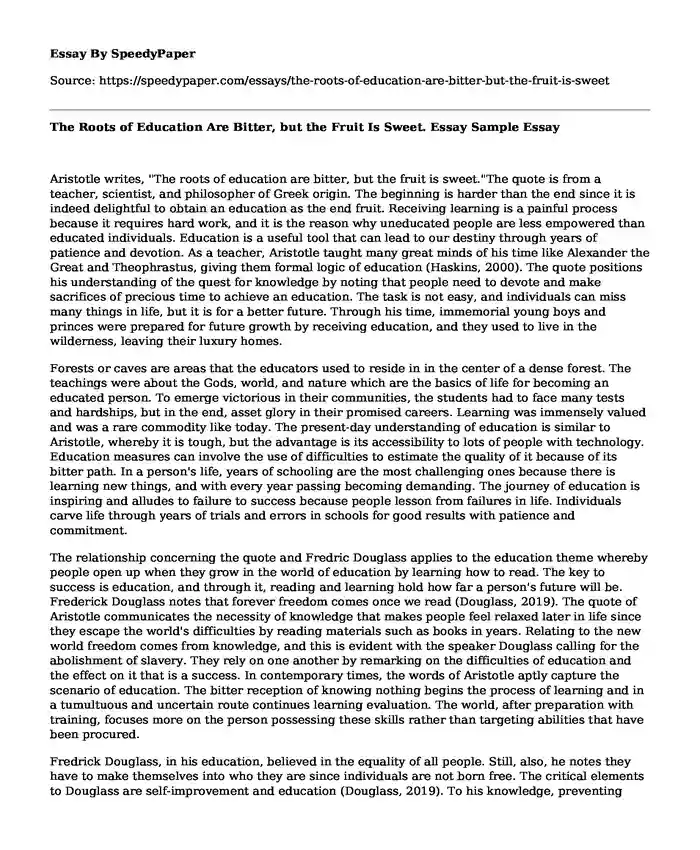
| Essay type: | Analytical essays |
| Categories: | Education Students Philosophy |
| Pages: | 3 |
| Wordcount: | 769 words |
Aristotle writes, "The roots of education are bitter, but the fruit is sweet."The quote is from a teacher, scientist, and philosopher of Greek origin. The beginning is harder than the end since it is indeed delightful to obtain an education as the end fruit. Receiving learning is a painful process because it requires hard work, and it is the reason why uneducated people are less empowered than educated individuals. Education is a useful tool that can lead to our destiny through years of patience and devotion. As a teacher, Aristotle taught many great minds of his time like Alexander the Great and Theophrastus, giving them formal logic of education (Haskins, 2000). The quote positions his understanding of the quest for knowledge by noting that people need to devote and make sacrifices of precious time to achieve an education. The task is not easy, and individuals can miss many things in life, but it is for a better future. Through his time, immemorial young boys and princes were prepared for future growth by receiving education, and they used to live in the wilderness, leaving their luxury homes.
Forests or caves are areas that the educators used to reside in in the center of a dense forest. The teachings were about the Gods, world, and nature which are the basics of life for becoming an educated person. To emerge victorious in their communities, the students had to face many tests and hardships, but in the end, asset glory in their promised careers. Learning was immensely valued and was a rare commodity like today. The present-day understanding of education is similar to Aristotle, whereby it is tough, but the advantage is its accessibility to lots of people with technology. Education measures can involve the use of difficulties to estimate the quality of it because of its bitter path. In a person's life, years of schooling are the most challenging ones because there is learning new things, and with every year passing becoming demanding. The journey of education is inspiring and alludes to failure to success because people lesson from failures in life. Individuals carve life through years of trials and errors in schools for good results with patience and commitment.
The relationship concerning the quote and Fredric Douglass applies to the education theme whereby people open up when they grow in the world of education by learning how to read. The key to success is education, and through it, reading and learning hold how far a person's future will be. Frederick Douglass notes that forever freedom comes once we read (Douglass, 2019). The quote of Aristotle communicates the necessity of knowledge that makes people feel relaxed later in life since they escape the world's difficulties by reading materials such as books in years. Relating to the new world freedom comes from knowledge, and this is evident with the speaker Douglass calling for the abolishment of slavery. They rely on one another by remarking on the difficulties of education and the effect on it that is a success. In contemporary times, the words of Aristotle aptly capture the scenario of education. The bitter reception of knowing nothing begins the process of learning and in a tumultuous and uncertain route continues learning evaluation. The world, after preparation with training, focuses more on the person possessing these skills rather than targeting abilities that have been procured.
Fredrick Douglass, in his education, believed in the equality of all people. Still, also, he notes they have to make themselves into who they are since individuals are not born free. The critical elements to Douglass are self-improvement and education (Douglass, 2019). To his knowledge, preventing individuals from learning so that they can improve themselves is the worst thing about slavery. Douglass wrote The Narrative of the Life opposite slavery and education and expand his horizon through reading in trying to make him free. Education gives him strength since there is a need for a real escape to secure his freedom and transpire. The essential part of Douglass's growth is education and literacy, making him free in his final step act of writing the Narrative. The use of exam practice can generally improve academic performance in schools and help weigh students for empowerment. The strategy can help in allocating students that need development through individual tutoring and make them concentrate on educational content.
References
Douglass, F. (2019). Narrative of the life of Frederick Douglass. Dreamscape Media, LLC.
Haskins, E. V. (2000). Mimesis between poetics and rhetoric: Performance culture and civic education in Plato, Isocrates, and Aristotle. Rhetoric Society Quarterly, 30(3), 7-33. doi 10.1080/02773940009391180. Retrieved May 12, 2020, from https://www.researchgate.net/publication
Cite this page
The Roots of Education Are Bitter, but the Fruit Is Sweet. Essay Sample. (2023, Jul 23). Retrieved from https://speedypaper.com/essays/the-roots-of-education-are-bitter-but-the-fruit-is-sweet
Request Removal
If you are the original author of this essay and no longer wish to have it published on the SpeedyPaper website, please click below to request its removal:
- Free Essay on Relating Temporal Cognition to Romanticism and Existentialism
- Action Plan Essay Example: How to Become an Influential Educator
- Grad School Application Essay, Free Example for You
- Essay Sample on Online Scholarly Discussions
- Free Essay Example: Renewable Energies
- Essay Sample on The Plato's Apology
- Free Essay: Dual Admission Program
Popular categories




